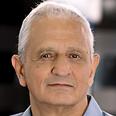Israel
moves towards the ceasefire beaten, in conflict, and worried. Both sides are indicating it promises to be a "Lebanese cease fire": Temporary quiet until the next round.
Maybe not even that. The UN may consider the war over, but up north it continues unabated. It is exacting, and will continue to exact, a heavy toll.
The war is not over, but the ceasefire resolution allows the infighting to begin in Israel. This time, it appears this battle will be all-out war: The government against the IDF brass, Ehud Olmert against Amir Peretz, generals against generals, Knesset members against government ministers, the current government against the previous one.
Every one feels they have been poorly treated, everyone feels they've been betrayed, everyone is waiting for the moment Nasrallah gives them the opportunity to get it all out.
Political victory? on paper
The Security Council decision is a significant political achievement for the United States and Israel. It is infinitely better than the draft Olmert rejected at 3:00 Friday morning. Olmert and Foreign Minister Tzipi Livni believe the resolution is even better than the American-French proposal put on the table a week earlier.
On paper, it's a good agreement. In theory, it promises both the disarming of Hizbullah and its removal from the north, in addition to the release of the two kidnapped soldiers, a strong, multi-national force to deploy in Lebanon, authorized to enforce its will, and it suggests international authority over entry to Lebanon.
One would have to be an eternal optimist to believe the agreement will be enforced as written.
Show of force
The IDF demanded 60 additional hours of full activity in Lebanon before the ceasefire agreement came into effect. It got 60 additional hours.
The goal was to capture strategic points in south Lebanon, up to the Litani River, as well as to cleanse the area of Hizbullah holdouts.
Chief of Staff Dan Halutz said that aside from the Security Concil resolution, the IDF's massive show of force would leave a lasting impression on Lebanon. He convinced Olmert, as well as President Bush and Kofi Annan.
Unfortunately, massive shows of force also mean losses. When weighing up the costs and benefits of this war, it is highly questionably whether this last-minute exercise will pay off. Soldiers are supposed to remain in the area two-to-three weeks, until the multi-national force arrives to bolster UNIFIL.
Hizbullah will try to attack them, as they did before Israel withdrew from the area in May, 2000. It is painful to Israel playing right into Hizbullah's hands.
Significant losses
The question about what happened to Israel during this war must be thoroughly discussed. It was a war in which Israel was hit and Lebanon was hit and Hizbullah was hit.
It is natural for Israelis to focus on our losses. These are not insignificant: Civilian life has been silenced; hundreds of thousands of Israelis have become refugees.
Perhaps worst of all: The revelation that the IDF is incapable of living up to the aura surrounding it. It is not only incapable of beating a small guerilla organization like Hizbullah; it is incapable of providing food and water to its soldiers.
Crisis of faith
The sharp crisis of faith that has developed between the IDF and the political echelon is reminiscent of the Yom Kippur War.
When the Arabs are in trouble, they start to lie. This is true, even for a seasoned politician like Nasrallah. When Israelis are in trouble, they speak the truth. This is one of the secrets of our advantage over the other side.
The truth must be told: We did not win this war. This can be proven by the following hypothetical question I heard yesterday from one former Israeli leader: If Nasrallah would have been asked a month ago if he would have started this war knowing it would end with his organization in the state it currently is, he would likely have answered "yes."
And what if Israeli government ministers had been asked a month ago if they would have approved this operation, knowing the war would have led to the current state of affairs? They would have hemmed and hawed and looked to move on to the next question.
















